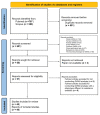Genome-Wide Association Studies (GWAS) Approaches for the Detection of Genetic Variants Associated with Antibiotic Resistance: A Systematic Review
- PMID: 38138010
- PMCID: PMC10745584
- DOI: 10.3390/microorganisms11122866
Genome-Wide Association Studies (GWAS) Approaches for the Detection of Genetic Variants Associated with Antibiotic Resistance: A Systematic Review
Abstract
Antibiotic resistance is a significant threat to public health worldwide. Genome-wide association studies (GWAS) have emerged as a powerful tool to identify genetic variants associated with this antibiotic resistance. By analyzing large datasets of bacterial genomes, GWAS can provide valuable insights into the resistance mechanisms and facilitate the discovery of new drug targets. The present study aimed to undertake a systematic review of different GWAS approaches used for detecting genetic variants associated with antibiotic resistance. We comprehensively searched the PubMed and Scopus databases to identify relevant studies published from 2013 to February 2023. A total of 40 studies met our inclusion criteria. These studies explored a wide range of bacterial species, antibiotics, and study designs. Notably, most of the studies were centered around human pathogens such as Mycobacterium tuberculosis, Escherichia coli, Neisseria gonorrhoeae, and Staphylococcus aureus. The review seeks to explore the several GWAS approaches utilized to investigate the genetic mechanisms associated with antibiotic resistance. Furthermore, it examines the contributions of GWAS approaches in identifying resistance-associated genetic variants through binary and continuous phenotypes. Overall, GWAS holds great potential to enhance our understanding of bacterial resistance and improve strategies to combat infectious diseases.
Keywords: antimicrobial resistance; bacteria; genetic variants; genome-wide association study.
Conflict of interest statement
The authors declare no conflict of interest.
Figures


Similar articles
-
Benchmarking bacterial genome-wide association study methods using simulated genomes and phenotypes.Microb Genom. 2020 Mar;6(3):e000337. doi: 10.1099/mgen.0.000337. Microb Genom. 2020. PMID: 32100713 Free PMC article.
-
Genome-Wide Association Studies for the Detection of Genetic Variants Associated With Daptomycin and Ceftaroline Resistance in Staphylococcus aureus.Front Microbiol. 2021 Feb 15;12:639660. doi: 10.3389/fmicb.2021.639660. eCollection 2021. Front Microbiol. 2021. PMID: 33658988 Free PMC article.
-
A fast and agnostic method for bacterial genome-wide association studies: Bridging the gap between k-mers and genetic events.PLoS Genet. 2018 Nov 12;14(11):e1007758. doi: 10.1371/journal.pgen.1007758. eCollection 2018 Nov. PLoS Genet. 2018. PMID: 30419019 Free PMC article.
-
Bacterial Infections and Their Antibiotic Resistance Pattern in Ethiopia: A Systematic Review.Adv Prev Med. 2019 Aug 5;2019:4380309. doi: 10.1155/2019/4380309. eCollection 2019. Adv Prev Med. 2019. PMID: 31467724 Free PMC article. Review.
-
The advent of genome-wide association studies for bacteria.Curr Opin Microbiol. 2015 Jun;25:17-24. doi: 10.1016/j.mib.2015.03.002. Epub 2015 Mar 31. Curr Opin Microbiol. 2015. PMID: 25835153 Review.
Cited by
-
Integrating Genomic Data with the Development of CRISPR-Based Point-of-Care-Testing for Bacterial Infections.Curr Clin Microbiol Rep. 2024;11(4):241-258. doi: 10.1007/s40588-024-00236-7. Epub 2024 Oct 15. Curr Clin Microbiol Rep. 2024. PMID: 39525369 Free PMC article. Review.
-
Exploring the Common Genetic Underpinnings of Chronic Pulmonary Disease and Esophageal Carcinoma Susceptibility.J Cancer. 2024 Apr 29;15(11):3406-3417. doi: 10.7150/jca.95437. eCollection 2024. J Cancer. 2024. PMID: 38817868 Free PMC article.
References
-
- O’Neill J. Antimicrobial Resistance: Tackling a Crisis for the Health and Wealth of Nations. Review on Antimicrobial Resistance; London, UK: 2014.
-
- Antimicrobial Resistance. [(accessed on 1 August 2023)]. Available online: https://www.who.int/news-room/fact-sheets/detail/antimicrobial-resistance.
Publication types
Grants and funding
LinkOut - more resources
Full Text Sources
Miscellaneous

